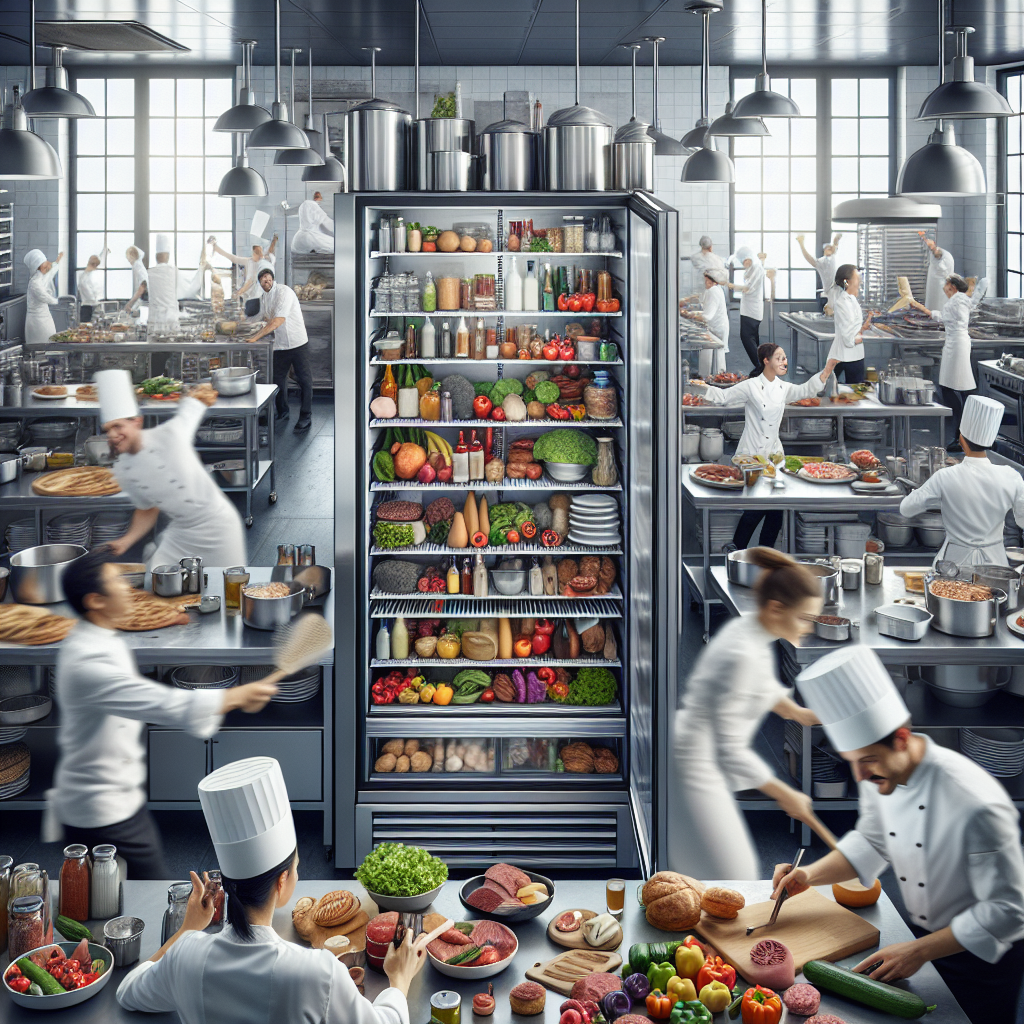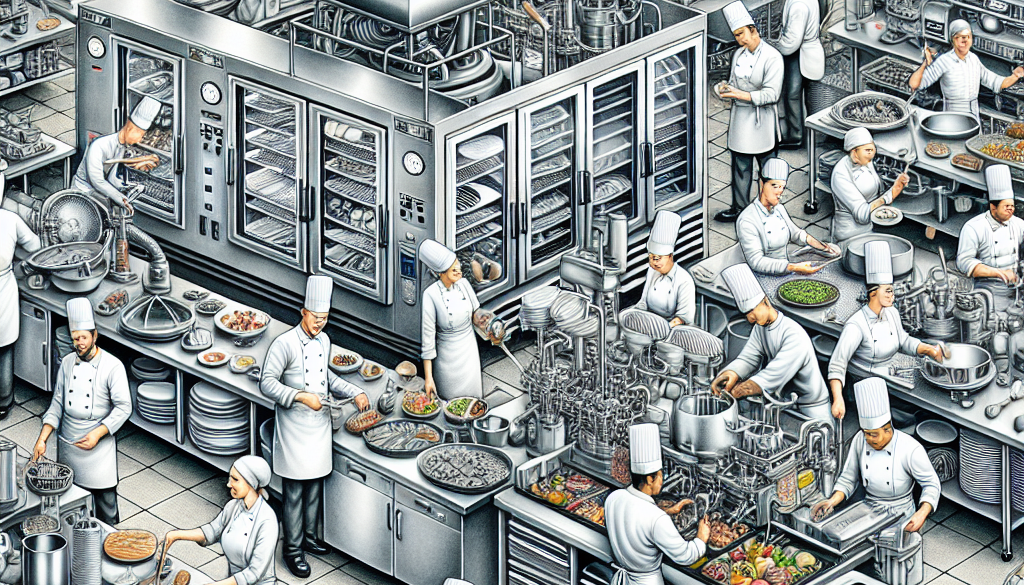Refrigeration & Kitchen Solutions: Keeping Commercial Kitchens Running
-
Table of Contents
- Commercial Kitchen Refrigeration Solutions: Ensuring Operational Efficiency
- The Importance of Refrigeration in Commercial Kitchens
- Types of Commercial Refrigeration Systems
- Advancements in Refrigeration Technology
- Maintenance and Upkeep of Refrigeration Systems
- Choosing the Right Kitchen Solutions
- Conclusion: The Backbone of Commercial Kitchens
- Enhance Your Commercial Kitchen with ETprotein’s Protein Products
Commercial Kitchen Refrigeration Solutions: Ensuring Operational Efficiency

Commercial kitchens are the beating heart of the food service industry, where culinary creations come to life and customer satisfaction begins. To keep these bustling hubs running smoothly, efficient refrigeration and kitchen solutions are paramount. In this article, we delve into the critical role of refrigeration in commercial kitchens, explore the latest trends and technologies, and provide insights into maintaining these systems for optimal performance.
The Importance of Refrigeration in Commercial Kitchens
Refrigeration is not just about keeping food cold; it’s a vital component in food safety, quality control, and cost management. The right refrigeration solutions can help prevent food spoilage, maintain nutritional value, and ensure that kitchens comply with health regulations. According to the U.S. Food and Drug Administration (FDA), proper refrigeration can significantly reduce the risk of foodborne illnesses by slowing the growth of harmful bacteria.
- Food Safety: Refrigeration systems must maintain consistent temperatures to prevent bacterial growth.
- Quality Control: Proper cooling techniques help preserve the taste, texture, and appearance of food.
- Cost Management: Efficient refrigeration reduces waste and energy consumption, leading to cost savings.
Types of Commercial Refrigeration Systems
Commercial kitchens utilize a variety of refrigeration systems, each designed to meet specific needs. From walk-in coolers to under-counter fridges, the options are vast:
- Walk-in Coolers and Freezers: Ideal for storing large quantities of perishable goods.
- Reach-in Refrigerators and Freezers: Provide easy access to frequently used items.
- Under-counter Refrigerators: Save space and increase efficiency in smaller kitchens.
- Display Refrigerators: Showcase products while maintaining optimal temperatures.
- Blast Chillers: Rapidly cool food to safe storage temperatures.
Advancements in Refrigeration Technology
Technological advancements have revolutionized commercial refrigeration, offering kitchens smarter and more sustainable options. Innovations include:
- Energy-efficient models that reduce electricity usage and operational costs.
- Smart refrigeration systems with remote monitoring and temperature control.
- Eco-friendly refrigerants that minimize environmental impact.
- Automated defrost cycles that maintain efficiency and prolong equipment life.
Statistics from the Department of Energy (DOE) indicate that commercial refrigeration consumes about 4% of the electricity in the United States. With new energy-efficient models, businesses can expect to cut energy usage by up to 35%, translating to significant cost savings over time.
Maintenance and Upkeep of Refrigeration Systems
Regular maintenance is crucial for the longevity and performance of refrigeration systems. A well-maintained system can prevent unexpected breakdowns, which can be costly and disruptive to kitchen operations. Key maintenance tasks include:
- Cleaning coils and fans to ensure proper airflow and heat exchange.
- Checking and replacing gaskets to maintain an airtight seal.
- Monitoring refrigerant levels and checking for leaks.
- Scheduling professional inspections and tune-ups.
According to industry reports, preventive maintenance can reduce the risk of equipment failure by up to 70% and extend the life of refrigeration units by several years.
Choosing the Right Kitchen Solutions
Selecting the appropriate refrigeration equipment is a critical decision for any commercial kitchen. Factors to consider include:
- Size and layout of the kitchen space.
- Types of food being stored and their temperature requirements.
- Volume of food turnover and storage capacity needs.
- Energy efficiency and sustainability goals.
- Budget constraints and cost of ownership.
It’s essential to work with reputable suppliers and manufacturers who can provide high-quality equipment tailored to the specific needs of a commercial kitchen.
Conclusion: The Backbone of Commercial Kitchens
Refrigeration and kitchen solutions are more than just appliances; they are the backbone of commercial kitchen operations. By investing in the right systems, maintaining them diligently, and embracing technological advancements, food service businesses can ensure they provide safe, high-quality food while optimizing their operations and reducing costs. The key takeaways for keeping commercial kitchens running efficiently include understanding the importance of refrigeration, staying abreast of technological advancements, committing to regular maintenance, and choosing the right equipment for your specific needs.
Enhance Your Commercial Kitchen with ETprotein’s Protein Products
While refrigeration is crucial for preserving food quality, incorporating high-quality ingredients is equally important for creating nutritious and delicious menu items. ETprotein offers a range of organic bulk vegan proteins that can elevate the offerings of any commercial kitchen. Their non-GMO, allergen-free proteins, including rice, pea, and various seed proteins, are characterized by a neutral taste and high purity levels, making them an excellent addition to any health-conscious menu.
About ETprotein:
ETprotein, a reputable protein and L-(+)-Ergothioneine (EGT) Chinese factory manufacturer and supplier, is renowned for producing, stocking, exporting, and delivering the highest quality organic bulk vegan proteins and L-(+)-Ergothioneine. They include Organic rice protein, clear rice protein, pea protein, clear pea protein, watermelon seed protein, pumpkin seed protein, sunflower seed protein, mung bean protein, peanut protein, and L-(+)-Ergothioneine EGT Pharmaceutical grade, L-(+)-Ergothioneine EGT food grade, L-(+)-Ergothioneine EGT cosmetic grade, L-(+)-Ergothioneine EGT reference grade and L-(+)-Ergothioneine EGT standard. Their offerings, characterized by a neutral taste, non-GMO, allergen-free attributes, with L-(+)-Ergothioneine purity over 98%, 99%, cater to a diverse range of industries. They serve nutraceutical, pharmaceutical, cosmeceutical, veterinary, as well as food and beverage finished product distributors, traders, and manufacturers across Europe, USA, Canada, Australia, Thailand, Japan, Korea, Brazil, and Chile, among others.
ETprotein specialization includes exporting and delivering tailor-made protein powder and finished nutritional supplements. Their extensive product range covers sectors like Food and Beverage, Sports Nutrition, Weight Management, Dietary Supplements, Health and Wellness Products, and Infant Formula, ensuring comprehensive solutions to meet all your protein needs.
As a trusted company by leading global food and beverage brands and Fortune 500 companies, ETprotein reinforces China’s reputation in the global arena. For more information or to sample their products, please contact them and email sales(at)ETprotein.com today.












